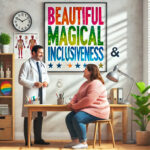Listen to us: women with lived experience of severe and enduring anorexia nervosa
Women with eating disorders are fed up with being treated like children

Listen to us: women with lived experience of severe and enduring anorexia nervosa
Improved outcomes for adults with eating disorders are possible! Karen, Tanya and Anne could be forgiven for feeling down-hearted after struggling for decades with Severe and Enduring Anorexia Nervosa (SEAN). However, they live in HOPE.
This article is a collaboration by three Australian women in their fifties. Between them, they have more than 120 years of experience living with and receiving treatment for anorexia nervosa. Their calendars are filled with community health medical appointments in a bid to avoid yet another hospital or eating disorder unit admission.
The women—Tanya Motiani, Karen Louise, and Anne—whose inpatient admissions are in the hundreds, say adults have different needs to younger people with an eating disorder. They believe inpatient adult care can be significantly improved for little or no cost.
Don’t treat me like I have done something wrong, says Karen
Improvements to care for adults with eating disorders can be made with little cost, and fresh attitudes will lead to better quality of life outcomes.
Above all, the core message that stays with me when leaving an inpatient facility is:
I am an adult. I always show others respect, and I expect the same level of respect returned to me.
Things I would change to improve inpatient treatment:
1. I enter inpatient treatment voluntarily
Please don’t treat me like I have done something wrong.
Don’t remove all my rights.
Don’t tell me I am wrong.
I look for care, recognising I struggle to provide it for myself.
I come hoping to find compassion as I struggle to extend it to myself.
I am not a threat.
I have not hurt anyone (other than myself, I am asking for help).
I am not a criminal or a murderer.
Locking me in a room, confiscating my belongings, and leaving me alone, essentially stripping away my dignity and dehumanising me, does not contribute to my recovery in any way.
I understand the argument for rules as they provide structure, but I hold a different view. I didn’t come seeking a rigid approach. Instead, I believe in treating everyone with compassion. Those who deviate from the norms can be addressed separately without imposing strict regulations on everyone else.
We all come for CARE.
I do not want a minimum or maximum mandatory stay enforced on me.
2. I am part of my team
a. Every time I need to be admitted to an ED unit, it is a fight between me, my ED and my community-based treatment team at home.
b. I have given over my care to everyone else, and I am scared to leave my familiar support for an inpatient admission.
c. After agreeing to admission, I feel alarmed when there’s no proper handover process, leaving me to start from scratch. It’s frustrating when the inpatient facility is unwilling to communicate with my home team for a comprehensive handover. The home team possesses a deeper understanding of my condition, which I struggle to communicate accurately, especially when embedded in my eating disorder.
d. When I am in treatment, I want to be included in the meetings about me. ALL OF THEM.
3. I am HERE ON LOAN
a. As an inpatient, I want to set goals and participate in decision-making. I am sure it is easier for the authorities to make decisions without me, but I want someone to be by my side, helping me until my mind is clear. I want to be a part of my team from the beginning.
b. To ensure success, I want a Zoom meeting involving the inpatient staff and my home care team, with me present, to provide a comprehensive handover before my discharge. This is non-negotiable. As I contemplate returning home, it’s essential for me that my home team is actively involved in the process.
d. By the time I get home, my ED will have sprung a few leaks. I want it to have no wins. This is why step-down care is vital.
Dietician, PLEASE treat me like an adult
a. I know I need a meal plan and am not eating enough to sustain a grown adult woman. HOWEVER, that does not permit you to treat me like a child.
b. I am in an EATING DISORDER unit. Why is the dietitian not one of the first people I meet? Usually, I don’t see the dietitian until Day Three or Four.
c. And (please excuse my judgment here) why are the dietitians in ED units super young? Why do they speak in high voices and have rabbits and butterflies follow them around, like in a Disney movie?
d. I do not need to eat the same amount of food as a 16-year-old. A tailored meal plan from the start is not too much to expect.
e. Weight restoration is different at my age from someone younger; please don’t tell me it isn’t.
f. Three food “dislikes.” After a lifetime of being ruled by an ED, it is plausible that simply picking three foods is unrealistic to eliminate from a meal plan.
g. Staff pressure to eat quickly during mealtimes exacerbates my eating disorder. Implementing management and support strategies around this issue, rather than resorting to punitive measures, is straightforward and effective.
h. I am here to address my malnourishment. Not to learn to eat fast.
Allow us to feel safe and respected, says Tanya
Tanya Motiani began developing symptoms of anorexia at age 11. Forty-eight years later, she has a comprehensive treatment team but does not aspire towards recovery. This is Tanya’s story:
“For years, my treatment team has endeavoured to persuade me that my eating disorder (ED) and I are two different things, one forever in battle against the other.
I do not believe this to be so, seeing myself and my ED as the same entity: I am the ED, and the ED is me. As such, my ED and I are compatible; we exist in unison, two peas in a pod, and we never disagree. Health professionals suggest the basic element of my identity/personality is likely the main stumbling block to my recovery.
As an inpatient, I want to feel safe, nurtured, and genuinely supported. I want the staff to help me feel respected and safeguard my dignity.
The absence of a one-size-fits-all approach would validate my individuality and that of others with an ED in terms of duration, age and mode. Likewise, the absence of a discharge deadline would help me relax. I want to avoid feeling pressured to ‘recover’ within a set time.
Realistically, I have had an eating disorder for nearly 50 years, and I cannot expect to suddenly not have one within a few short weeks.
Feeling safe, respected and supported is crucial to being able to relax enough – and honest and open enough – to challenge my most persistent ED thoughts and behaviours.
A ‘contract’, collaboratively created, will appease my need to maintain control, one of my most vital personality traits. Inpatient clinics can make the patient feel powerless and hopeless, with little, if any, sense of efficacy and autonomy.
Dietetics is my biggest challenge
So far, my experience with dieticians has felt didactic and militant, with all choices negated and any sense of self-input invalid. Each has felt like a threat, consequently leading not only to exacerbated insecurity but also to lowered self-esteem and dignity. Furthermore, such approaches have been counterproductive as they have left me feeling rebellious with low motivation—the opposite of the anticipated effect of dietetic therapy.
Ideally, language should be centred around outcomes, effects, incentives, motivations, and results rather than negatively connoted words such as punishments, privileges, entitlements, successes and failures, consequences, penances, rewards, penalties, forfeits, price, breaches, violations, infringements.
The outcomes for reaching goals should be a part of the contract and determined collaboratively.
Ideally, no outcomes will be food-related. For example, during one inpatient stay, every time inpatients did not finish a meal, we had to sit at the table in front of all the other patients until we drank two Ensures, no matter how long this took. This was regardless of whether we were feeling physically unwell or were noticeably mentally anguished.
This felt like torture, humiliation and degradation. In-depth follow-ups on moments like this would be helpful for the patient. For instance, a discussion may help the inpatient understand why the goal was not reached, whether the same approach should be tried again or altered, or whether the goal needed an update.
I want to enhance my quality of life
Because I am not at the point where recovery is a goal, my primary aim is to enhance my quality of life through self-care and self-love. In a non-clinical internal and external environment, the activities, staffing, and programming would demonstrate how meaningful my quality of life could be, motivating me to improve the quality of my day-to-day situation.
Aside from environmental aesthetics, the basic elements allowing this shift include respect and dignity, the opportunity to be seen and understood, and minimal formulaic, prescriptive therapy. Fully trained staff, preferably with lived experience, would be generous with warmth and empathy and offer various diverting activities and pastimes.
These elements maximise my chances of a positive inpatient experience and an improved quality of life. Ideally, my mindset would become more at ease and more open to embracing the possibilities for change.
Allow us to make a cuppa at any time, says Anne
We need to examine what inpatient care is available and consider how it can be modified to better suit the situation of adult women.
All that is required is the will of management and doctors to separate the age groups and implement more age-appropriate treatment. Health providers have effectively achieved this for people with other mental health challenges and disorders, so surely they can do the same with an adult ED unit.
An adult ED unit should include the following:
– Nurses trained on how to treat and support those with SEAN.
– Regularly reviewing and modifying standard menu plans and portion sizes to reflect the slower metabolism of older people.
– Age-appropriate outings to provide quality-of-life moments and enhance motivation.
– Adequate leave to practice eating regular meals in the outside world.
– Relaxation of unnecessary rules, e.g., allow tea/coffee in the unit anytime.
These changes could be implemented quickly and at minimal cost.
A private-sector program offering care like this would relieve pressure on the public health system and community support agencies, which currently bear the load of treating/supporting those with SEAN—sometimes when it’s too late.
Listen to the voice of experience
This message is worth repeating:
Improved outcomes for adults with eating disorders are possible! Karen, Tanya and Anne could be forgiven for feeling down-hearted after struggling for decades with SEAN. However, they live in HOPE.
Karen, Tanya and Anne feel sure that an examination of current facilities and consideration of how modifications and changes can be implemented, at little to no cost, to meet the specific needs of adults with eating disorders will make a world of difference to them and others.
Some ED clinics already offer yoga sessions, art rooms, gyms, massage therapy services, musical activities, inviting outdoor areas, and generously sized single rooms with attractive ensuite facilities.
All that is required is a willingness from management to listen to the voices of experience, like those of Karen, Tanya, and Anne, and for those with authority and influence to lobby those in charge of change.
The women firmly believe that with innovations like more training programs to provide nurses with the skills to care for and support eating disorder patients, efficiently managed private alternative programs can relieve the burden on public health systems and community support organisations caring for adults with SEAN.
- Are you an adult with an eating disorder? What improvements would you like to see in your treatment available to you? What changes will help you to improve your quality of life? Would you like to share your story on the Life Stories Diary blog? If so, tell me a little about your story.





